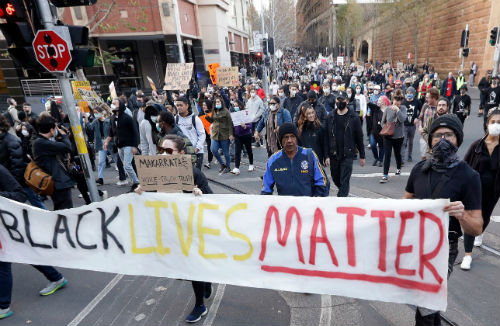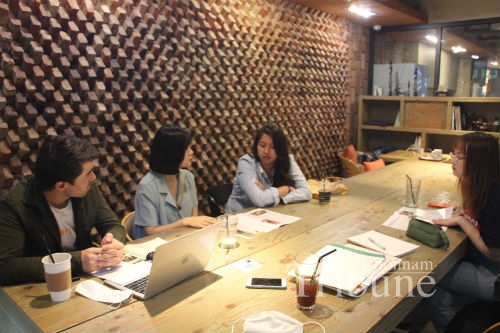Countering Discrimination Around the World

On May 25, there was an incident in the U.S. when a white police officer killed an unarmed African-American, George Floyd, by using excessive force. After which a video showing police officers immoderately subduing him was made by a witness, spread on the internet, and people started to protest against racial discrimination expanding across entire areas of the country. Since then, the ‘Black Lives Matter’ movement has spread all over the world. Actually, the different types of discrimination as well as racism have been occurring for a long time in every country even though many people are trying to fix this wrong practice around the world. The Chonnam Tribune had a roundtable talk on discrimination in various countries and cultural diversity in South Korea with international students at an off-campus café on August 11.

What is the most concerning issue related to discrimination in your country?
Sun Kaize (China): In our country, the biggest discrimination problem is sexism. When we get a job or a promotion in a company, the firm tends to prefer men over women. Society thinks that they have to pay more when they hire women because women cannot go on a business trip alone and corporates should be more concerned about security if women work at night. China is trying to fix this problem but I think it is quite hard to make equality between men and women in the current situation.
Yuly Andrea Ramirez Buitrago (Colombia): We have homosexual-related problems whereby many people hate gay people because of their sexual orientation. Since almost all of the population are Christian or Catholic, many people do not accept homosexuality but there is a movement where the Colombians are trying to support them. Another issue is a refugee problem. Many Venezuelans enter our country to make money and some of them commit crimes. That is our biggest matter, but nowadays, they endeavor to get back to their own country because of COVID-19.
How is the government in your country trying to solve those issues?
Javokhir Aslamov (Uzbekistan): Our country has sexism issues like other countries. In Uzbek society, women usually do the house chores instead of getting a job. So, the government has tried to solve this problem with relevant laws. Now they plan to propose a law for ensuring women’s rights and endeavor to make a better gender balance needed in colleges by introducing a gender quota system to guarantee a fixed number of female students.
Vu Thi Ngan (Vietnam): In Vietnam, we have a sexism problem as well. Our government provides more opportunities for women with specific majors which is related to technical work or they give compensation to women when they are in work to help grow the power of women. We also have long faced regional discrimination. People living in the southern region of our country including Ho Chi Minh are treated better than other regions’ people. So, the government is working hard to develop the central region as a tourist attraction spot to extinguish the distinction between regions.
What kinds of mindset should we keep in mind when we face discrimination problems?
Sun Kaize: Now China is working hard to get rid of sexism outwardly. However, I think absolute gender equality is impossible because men and women are different in various dimensions. So, they should respect each other and have a mindset to remove discrimination on the basis of gender. We also face regional discrimination, but I believe the best way to fix this problem is indifference and learning not to care about the opinions that discriminate against other regions.
Javokhir: I think we should be aware that discrimination comes from ignorance, and a narrow-minded person discriminates against others. As we know from the fact that the first fossil of mankind was found in Africa, we all came from the same continent and had the same colored skin at first, so there should be no reason to discriminate against others. We have to recognize that discrimination comes from ignorance. Therefore, we should continue to emphasize the importance of education.
What kind of law against discrimination has to be enacted first in your country?
Vu Thi Ngan: If the government decided to make a law related to discrimination, I believe that a law prohibiting every kind of discrimination would be better. The law about specific kinds of discrimination is limited to certain people, but legislation against all kinds of discrimination are applicable to a wide range of people who experience discrimination. The act for more people brings more peace to society.
Javokhir: I would prefer a law which covered all sorts of discrimination because it is like a dam. If there is even a tiny dam leakage, this water leak will cause the whole dam to collapse leading to a disaster. However, I am skeptical about the legislation of antidiscrimination acts because their efficiency is doubtful so I would rather recommend education to enhance equality and to counter discrimination so that children can broaden their perspective about it.
Have you experienced any discrimination in South Korea?
Andrea: In South Korea, there were some moments when I became a victim of discrimination as a foreigner. When I went to public places such as a bus or an elevator, Korean people treated me as if I had the coronavirus. An old guy on the bus applied sanitizer to his hands and moved away from me after watching me, and a woman in an elevator wore a mask when I entered although there were lots of people in there already. I think it is because of the coronavirus, but I felt kind of bad. I wanted to say to them “Let’s embrace the difference.” Likewise I am trying to understand Korean culture, so they should open their minds and make an effort to understand people from other countries.
Vu Thi Ngan: When I came to Korea, I tried to get a part-job and interviewed with the owners. In most cases, the owners had prejudice that foreigners cannot understand Korean well and sometimes they asked me about my nationality, but that was all. I think they do not prefer foreign people when hiring part-time workers. It is quite unfair because I am trying to study hard and make my life better in an unfamiliar country. So, I want to talk to them that they can be a foreigner in other countries and should be aware that they could be a victim of discrimination anytime. I think the attitude to respect each other is the best way to decrease discrimination.
As we discussed above, there are various kinds of discrimination problems around the world, and each country works hard to eliminate them with diverse policies. Ordinary people are also trying to accept difference and diversity and make a better society without victims of discrimination in all its forms. However, the most significant thing for removing discrimination is our mindset to respect the differences between us and understand cultural diversity and inclusion for people who are dissimilar to ourselves. We can make better a society by decreasing discrimination step by step.
By Jo Ye-rin, Student Editor
-------------------------------------------------------------------------------------------------------------
Sun Kaize, Freshman, Dept. of History, China
Yuly Andrea Ramirez Buitrago, Junior, Dept. of History, Colombia
Javokhir Aslamov, Junior, Business Administration, Uzbekistan
Vu Thi Ngan, Sophomore, Dept. of Korean Language and Literature, Vietnam

